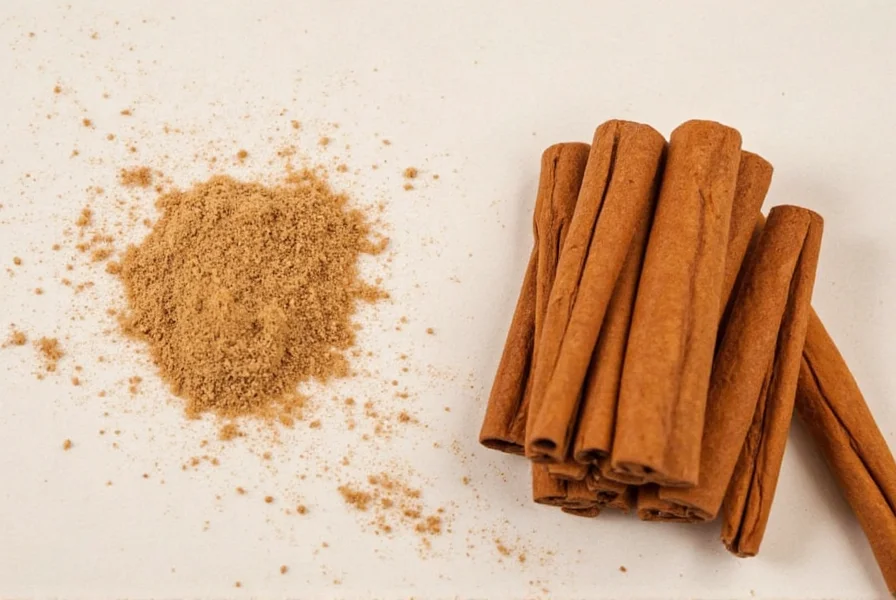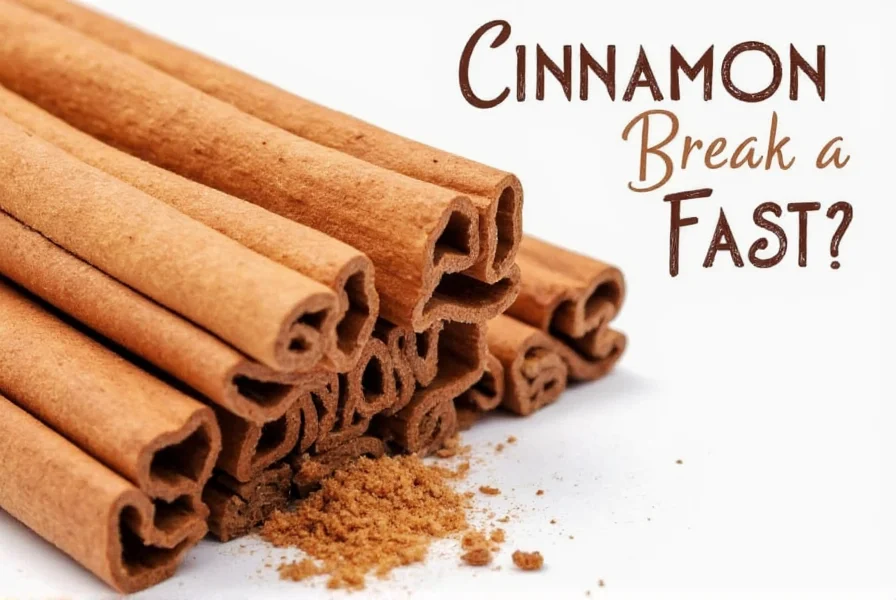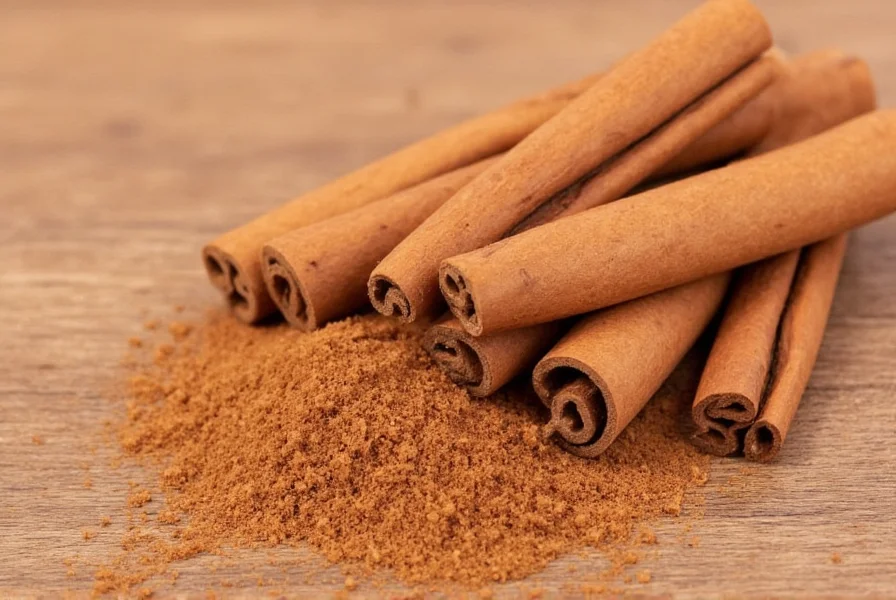For those practicing intermittent fasting or other fasting protocols, understanding what breaks a fast is crucial for maintaining the metabolic benefits. Cinnamon stands out as one of the most fasting-friendly flavor enhancers available, but let's examine the science behind why this common spice works well during fasting periods.
The Science of What Breaks a Fast
Before determining whether cinnamon breaks a fast, it's essential to understand what actually constitutes "breaking" a fast. A fast is generally considered broken when:
- You consume enough calories to trigger significant insulin response (typically 50+ calories)
- You ingest substances that stimulate digestion or metabolic processes
- You consume enough protein to halt autophagy
- You take in enough sugar to disrupt ketosis
The threshold for breaking a fast varies depending on your fasting goals. Those seeking maximum autophagy might be more restrictive, while others focused on weight loss might have a higher calorie threshold.
Nutritional Profile of Cinnamon
Let's examine the nutritional facts for cinnamon to determine its fasting compatibility:
| Nutrient | Per Teaspoon (2.6g) | Per Tablespoon (7.8g) |
|---|---|---|
| Calories | 6 | 18 |
| Total Carbohydrates | 2.1g | 6.4g |
| Sugar | 0.1g | 0.3g |
| Fiber | 1.7g | 5.1g |
| Protein | 0.1g | 0.3g |
As shown in the nutritional breakdown, cinnamon contains minimal calories and virtually no sugar in typical usage amounts. The fiber content actually provides potential benefits for blood sugar regulation without triggering insulin spikes.
Cinnamon's Effect on Insulin and Blood Sugar
Interestingly, research suggests cinnamon may actually improve insulin sensitivity rather than disrupt it. Multiple studies have shown that cinnamon can help lower blood glucose levels and improve insulin response:
- A 2012 review published in the Annals of Family Medicine found cinnamon supplementation significantly reduced fasting blood glucose levels
- Research in the Journal of the American Board of Family Medicine demonstrated cinnamon's potential to improve insulin sensitivity
- Studies suggest cinnamon's active compounds may mimic insulin and enhance glucose uptake
These effects mean that not only does cinnamon not break a fast by spiking insulin, it may actually support your metabolic health during fasting periods. This makes cinnamon during water fast particularly beneficial for those concerned about blood sugar regulation.

Different Fasting Protocols and Cinnamon
The acceptability of cinnamon during fasting depends somewhat on your specific fasting goals:
- Intermittent Fasting (16:8, 18:6, etc.): Cinnamon is generally accepted as it won't disrupt the fasting window's metabolic benefits
- Religious Fasting (Ramadan, Lent, etc.): Check specific religious guidelines, but most permit flavorings like cinnamon
- Water-Only Fasting: Some purists avoid all additives, but technically cinnamon doesn't break the fast physiologically
- Therapeutic Fasting for Autophagy: Cinnamon's minimal calorie content means it likely won't disrupt cellular cleanup processes
For those asking does cinnamon break intermittent fasting specifically, the answer remains no when used in normal culinary amounts (1/4 to 1 teaspoon).
Practical Tips for Using Cinnamon While Fasting
Here are evidence-based recommendations for incorporating cinnamon into your fasting routine:
- Stick to 1 teaspoon or less per fasting period to maintain minimal calorie intake
- Add to black coffee, tea, or water for flavor without breaking your fast
- Avoid cinnamon products with added sugars or fillers (check labels carefully)
- Pair with other fasting-friendly spices like ginger or turmeric for enhanced benefits
- Consider using Ceylon cinnamon ("true cinnamon") which has lower coumarin content
Many people wonder does cinnamon affect ketosis during fasting. The answer is no—cinnamon's negligible carbohydrate content means it won't disrupt ketone production, making it suitable for those combining fasting with ketogenic diets.
Common Misconceptions About Cinnamon and Fasting
Several myths persist about cinnamon and fasting that deserve clarification:
- Myth: Cinnamon spikes blood sugar and breaks a fast
Reality: Research shows cinnamon may actually improve blood sugar control - Myth: All cinnamon varieties have the same effect
Reality: Ceylon cinnamon is preferred over Cassia due to lower coumarin content - Myth: Any amount of cinnamon breaks autophagy
Reality: The minimal protein content in culinary amounts is unlikely to disrupt cellular cleanup - Myth: Cinnamon supplements are equally safe during fasting
Reality: Concentrated supplements may contain enough compounds to trigger metabolic responses

How Much Cinnamon Breaks a Fast?
The question of how much cinnamon breaks a fast is important for precision. While a teaspoon won't break your fast, extremely large amounts theoretically could:
- 1-2 teaspoons (5-10g): Still well below the threshold to break a fast
- 3-4 tablespoons (25-35g): Approaching 100 calories, which might disrupt some fasting benefits
- 1/4 cup (30g) or more: Contains approximately 120 calories, likely breaking most fasting protocols
In practical terms, no one would consume these extreme amounts of plain cinnamon—it would be unpalatable. Normal culinary usage (1/4 to 1 teaspoon) poses no risk to your fasting state.
Other Fasting-Friendly Spices
If you're looking for additional flavor options during fasting periods, consider these other spices that won't break your fast:
- Raw ginger (freshly grated in small amounts)
- Garlic powder (minimal amounts)
- Black pepper
- Vanilla extract (alcohol-based, in small amounts)
- Unsweetened cocoa powder (in moderation)
When exploring best spices for fasting, remember that whole spices generally have fewer calories than extracts or processed versions. Always check for added sugars or fillers in commercial spice blends.
Conclusion: Cinnamon as a Fasting Ally
Based on nutritional science and metabolic research, cinnamon does not break a fast when used in typical culinary amounts. Its minimal calorie content, negligible sugar, and potential blood sugar-regulating properties make it one of the most beneficial additions to your fasting routine.
Whether you're practicing intermittent fasting for weight loss, religious observance, or health optimization, adding cinnamon to your coffee, tea, or water can enhance flavor and potentially amplify some fasting benefits without compromising your fasting state. Just remember to stick to reasonable amounts (1 teaspoon or less) and avoid products with added sugars or fillers.
Does a pinch of cinnamon break a fast?
No, a pinch of cinnamon (approximately 1/8 teaspoon) contains only about 0.8 calories and negligible sugar, which is insufficient to break a fast or trigger significant insulin response. This small amount won't disrupt autophagy or ketosis.
Can I put cinnamon in my coffee while fasting?
Yes, adding 1/4 to 1 teaspoon of cinnamon to black coffee won't break your fast. The minimal calories in cinnamon won't trigger insulin release or disrupt the metabolic benefits of fasting. Just ensure you're not adding any sugar, milk, or cream.
Does cinnamon stop autophagy?
No, typical culinary amounts of cinnamon (up to 1 teaspoon) do not stop autophagy. Cinnamon contains minimal protein (0.1g per teaspoon) which is well below the threshold needed to disrupt cellular cleanup processes. Some research even suggests cinnamon's compounds may support autophagy.
Is Ceylon cinnamon better for fasting than Cassia?
Both types are acceptable for fasting as they have similar nutritional profiles. However, Ceylon cinnamon ("true cinnamon") contains significantly less coumarin, a compound that can be harmful in large amounts. For regular use during fasting, Ceylon is generally preferred for long-term safety.
How much cinnamon can I have while fasting?
You can safely consume up to 1-2 teaspoons of cinnamon during your fasting window without breaking your fast. This provides flavor and potential health benefits while keeping calorie intake below 15 calories, which is well under the threshold that would disrupt fasting benefits for most people.











 浙公网安备
33010002000092号
浙公网安备
33010002000092号 浙B2-20120091-4
浙B2-20120091-4